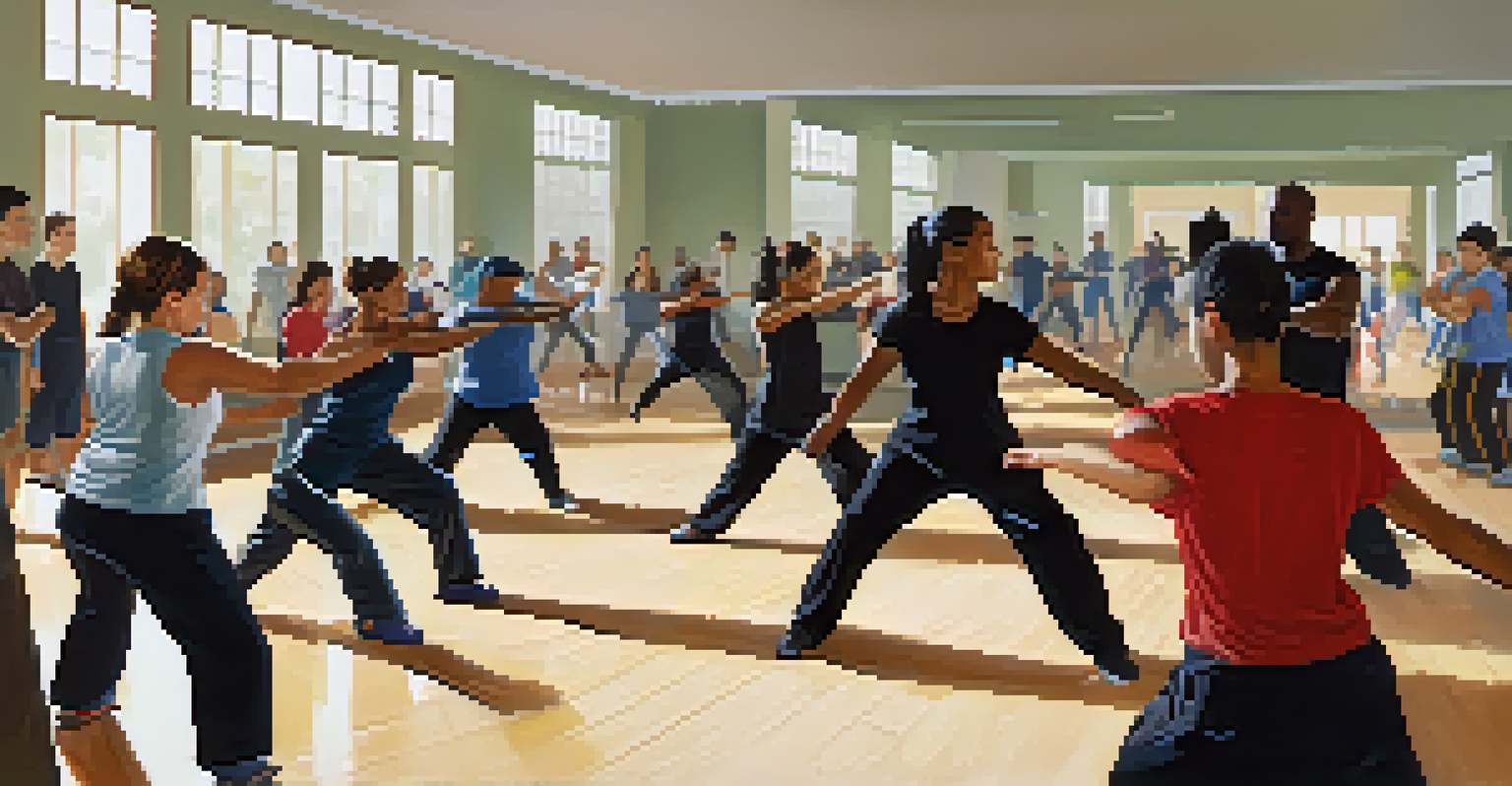The Right to Self Defense: A Global Perspective

Understanding the Concept of Self Defense
Self-defense is a legal and moral principle that allows individuals to protect themselves from harm. It’s an instinctive reaction to threats, yet the legal frameworks surrounding it vary significantly across countries. At its core, self-defense is about preserving one's life and safety in the face of danger, but what constitutes an acceptable response can differ widely.
Self-defense is not a privilege; it is a right that belongs to every individual.
In many jurisdictions, the right to self-defense is grounded in the notion of proportionality, meaning that the response must be appropriate to the threat faced. For instance, using lethal force in response to a non-lethal attack may not be justified. This principle aims to prevent excessive force and encourage a measured reaction to threats.
Cultural perceptions also play a significant role in shaping self-defense laws. In some societies, a strong emphasis on individual rights leads to broader interpretations of self-defense, while others prioritize community safety and may impose stricter limitations. Understanding these nuances is vital for grasping how self-defense is viewed globally.
Self Defense Laws in the United States
In the United States, self-defense laws can vary dramatically from state to state, creating a patchwork of legal protections. Some states adhere to 'stand your ground' laws, allowing individuals to use force without a duty to retreat when they feel threatened. This approach can lead to controversial cases, highlighting the complexities of self-defense in real-life situations.

Conversely, other states impose a 'duty to retreat' before using force, requiring individuals to seek safety if possible before resorting to violence. This difference reflects broader societal attitudes toward violence and personal responsibility, and it can significantly affect legal outcomes in self-defense cases.
Self-Defense Laws Vary by Region
The legal frameworks surrounding self-defense differ significantly across countries, influenced by factors like cultural perceptions and societal attitudes.
High-profile cases often spark debates around self-defense laws in the U.S., bringing issues of race, gun rights, and personal safety to the forefront. These discussions underscore the need for a balanced approach that respects individual rights while ensuring community safety.
Self Defense in Europe: A Different Approach
European countries generally have more restrictive self-defense laws compared to the U.S. While the right to self-defense exists, it is often tightly regulated, focusing on the necessity and proportionality of the response. For instance, in countries like Germany, individuals are expected to retreat if possible before using force, aligning with a broader commitment to de-escalation.
The law is reason, free from passion.
Moreover, the legal definitions of self-defense can differ. In the UK, for example, the law emphasizes a 'reasonable' response, which is often interpreted through the lens of what an ordinary person would consider appropriate in a given situation. This subjective standard can lead to varied interpretations in court, making outcomes less predictable.
Cultural factors also influence self-defense laws in Europe. Many countries prioritize social cohesion and conflict resolution over individual rights, thus shaping a legal framework that encourages non-violent solutions whenever possible. This approach reflects a collective ethos that permeates various aspects of European law and society.
Cultural Perspectives on Self Defense
Cultural beliefs significantly shape how self-defense is perceived and legal frameworks are established. In cultures that value individualism, there may be a stronger emphasis on personal rights and the right to protect oneself. In contrast, collectivist societies often prioritize community safety, leading to stricter self-defense regulations.
For example, in many Asian cultures, the concept of 'saving face' can influence perceptions of conflict and self-defense. Avoiding confrontation might be seen as a virtue, which can affect how laws are applied and interpreted. This highlights the importance of cultural context when discussing self-defense rights globally.
Cultural Impact on Self-Defense
Cultural beliefs shape how self-defense is perceived, with individualistic societies emphasizing personal rights while collectivist cultures prioritize community safety.
Understanding these cultural perspectives is crucial for navigating the complexities of self-defense laws. By recognizing the values and beliefs that underpin different legal systems, individuals can appreciate the diverse ways in which self-defense is approached around the world.
Gender Considerations in Self Defense
Gender plays a significant role in discussions about self-defense, particularly in how laws are applied and understood. Women, for instance, often face unique threats that can influence the justification for self-defense. Many legal systems are beginning to acknowledge these disparities and are adapting their frameworks accordingly.
In some jurisdictions, women may have broader justification for using force in self-defense, particularly in cases of domestic violence. This shift recognizes the specific vulnerabilities women may face and aims to provide legal protections that reflect these realities. However, the application of these laws can still be inconsistent.
The conversation around gender and self-defense also extends to societal attitudes and perceptions. Advocacy for women's rights has brought attention to the need for more equitable self-defense laws, highlighting the importance of understanding the intersectionality of gender, violence, and legal protections.
International Treaties and Self Defense
International law recognizes the right to self-defense, particularly in the context of armed conflict and state sovereignty. Article 51 of the United Nations Charter allows nations to defend themselves against armed attacks, but the application of this principle can be contentious. This raises questions about the balance between national security and the rights of individuals.
Moreover, international human rights agreements often emphasize the protection of individuals against violence, which can complicate discussions surrounding self-defense. For instance, the right to life is a fundamental principle that must be weighed against the right to defend oneself. Navigating these rights requires careful consideration of the context and implications.
Emerging Issues in Self-Defense Laws
As society evolves, discussions around gender considerations and digital threats are prompting reforms in self-defense laws to better reflect modern realities.
The interplay between national and international laws also affects how self-defense is perceived globally. Countries may adopt or adapt international standards to fit their legal frameworks, leading to variations in how self-defense rights are understood and enforced in different regions.
The Future of Self Defense Laws
As societies evolve, so too do the laws governing self-defense. Current trends indicate a growing awareness of the complexities surrounding self-defense, prompting discussions about reforming existing laws. Advocates for change argue that legal frameworks should better reflect the realities of modern life and the diverse threats individuals face.
Additionally, advancements in technology and changes in social dynamics are reshaping the landscape of self-defense. For example, the rise of digital threats requires a reevaluation of what self-defense means in the online realm, extending the conversation beyond physical confrontations. This evolution presents both challenges and opportunities for legal systems worldwide.

Ultimately, the future of self-defense laws will likely involve a balancing act between individual rights and community safety. As societies continue to grapple with issues of violence, equity, and justice, self-defense will remain a critical topic of discussion in the quest for a safer world.